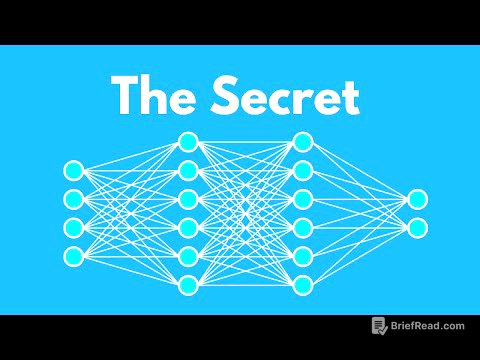TLDR;
The video discusses the implications of a new executive order signed by President Trump that significantly increases the fees for skilled workers, particularly those from India, seeking H1B visas to work in the United States. This move is seen as a way to prioritize American workers and encourage companies to hire domestically. The video explores the potential impact on Indian professionals, the Indian economy, and the broader dynamics between the US and India, while also touching upon the need for India to improve its infrastructure and create more opportunities for its own talent.
- Trump's executive order increases H1B visa fees, potentially impacting Indian skilled workers.
- The move aims to prioritize American workers and encourage domestic hiring.
- The video discusses the potential benefits and drawbacks for both the US and India.
Introduction [0:00]
The video introduces President Trump's new executive order that increases the fees for skilled workers seeking H1B visas to work in the United States. It highlights the significant increase in fees, from approximately ₹6 lakh for three years to ₹88 lakh per year, making it more expensive for Indian professionals to work in the US. The speaker suggests this move is designed to make American companies think twice about hiring foreign workers and instead focus on employing Americans.
Impact on Indian Workers and US-India Relations [1:51]
The speaker discusses the potential impact of the new visa fees on Indian workers and the relationship between the US and India. If the relationship is viewed as one of "owner and worker," then the relations are likely to sour. The increased costs could deter Indian talent from seeking jobs in the US, potentially benefiting India by retaining skilled professionals. However, it could also negatively impact remittances sent back to India, affecting the country's foreign exchange reserves.
The American Perspective and H1B Visa Details [3:34]
The video explains that Trump's decision aims to pressure American companies to hire American graduates by making it more expensive to bring in foreign workers on H1B visas. The H1B visa is a permit that allows foreign nationals with specialized skills to work in the US. The US typically grants 85,000 H1B visas annually, with a significant portion (around 70%) going to Indian professionals. The speaker emphasizes that Trump's policy aligns with his "America First" agenda, prioritizing American jobs for American citizens.
The Rationale Behind the Fee Hike [8:42]
The speaker elaborates on the rationale behind the increased visa fees, stating that it is a deliberate move to make Indian workers more expensive for American companies, thereby incentivizing them to hire American workers. He mentions the presence of figures like Luttneck, who advocate for prioritizing American jobs. The speaker draws a parallel to the concept of prioritizing local talent in India, suggesting that there is nothing inherently wrong with a country wanting to protect its own workforce.
Potential Benefits for India [11:39]
The video shifts to discussing the potential benefits for India if Indian professionals choose to stay in their home country. It suggests that if Indian talent remains in India, it could lead to increased innovation and economic growth within the country. Additionally, American companies might be compelled to open more offices in India, creating more job opportunities domestically.
The Exodus and Corporate Response [17:05]
The speaker highlights the immediate impact of Trump's announcement, noting that many Indian professionals who were visiting India were urged to return to the US immediately to avoid the new visa fees. Companies like Microsoft, Meta, and Amazon reportedly gave their H1B visa holders very short notice to return to the US, underscoring the urgency and potential financial burden of the new policy.
Criticism of Indian Tech Leaders and the Need for Self-Respect [19:02]
The speaker criticizes Indian tech leaders in America for not standing up against the new policy and advocating for their fellow Indian professionals. He contrasts their behavior with that of Jewish billionaires who strongly advocate for Israel's interests, suggesting that Indian professionals should show more pride and assertiveness in defending their community's interests.
The Irony of Elon Musk's Stance [21:38]
The video touches on Elon Musk's past defense of H1B visa holders and his warning about the dangers of ignoring violence against others. The speaker suggests that the "America First" sentiment could eventually turn against even those Indian professionals who have become American citizens, highlighting the potential for increased discrimination and xenophobia.
Government Response and Long-Term Implications [23:10]
The speaker notes that the Indian government has offered assistance to those returning to the US, but also points out the potential long-term negative consequences of Trump's policy for the US economy. He cites analyses from organizations like NASSCOM, which suggest that these measures could hinder innovation and economic growth in the US.
India's Infrastructure Challenges and Missed Opportunities [24:33]
The video criticizes the state of infrastructure in India, citing the example of a startup that left Bangalore due to poor road conditions. The speaker argues that India needs to improve its infrastructure and create a more conducive environment for businesses to thrive, so that talented individuals and companies are not compelled to leave the country. He emphasizes the need for structural reforms to attract and retain talent within India.
Conclusion [26:39]
In conclusion, the speaker encourages viewers to share their thoughts on the issue and emphasizes the importance of viewing the situation with a positive outlook. He suggests that the challenges presented by Trump's policies could be an opportunity for India to strengthen its own economy and create more opportunities for its citizens.









